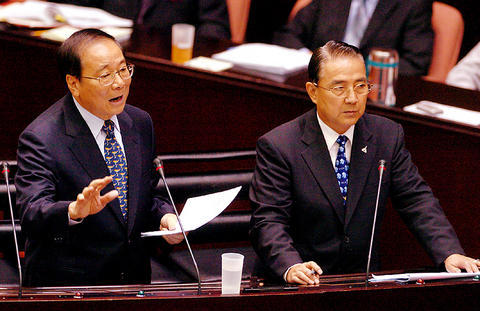Premier Chang Chun-hsiung (張俊雄) yesterday dismissed allegations by Chinese Nationalist Party (KMT) Legislator Su Chi (蘇起) that the Democratic Progressive Party (DPP) government was developing nuclear weapons to confront China's military threat and as a bargaining chip to negotiate with the US.
Chang made the rebuttal on the legislative floor during a question-and-answer session with Su.
Su said that President Chen Shui-bian (陳水扁) had told the Ministry of National Defense (MND)-affiliated Chungshan Institute of Science and Technology to develop a nuclear weapon.

PHOTO: LIAO CHEN-HUEI, TAIPEI TIMES
He also said that nuclear experts and a former national defense minister from a country equipped with nuclear weapons had been invited to discuss the issue.
Besides developing a nuclear weapon, Su said Chen was also pushing for the mass production of the locally developed Hsiung Feng II-E cruise missile.
political asylum
Su also said that Chen would seek political asylum in the US to protect himself from possible imprisonment over his role in the special allowance case when his presidential term comes to an end next year.
"With the development of the Hsiung Feng II-E and nuclear weapons, we are becoming another North Korea," said Su, a senior KMT member of the legislature's National Defense Committee.
Su said that he had obtained the information from a DPP Central Executive Committee member but he did not name the individual, nor did he provide proof to back his claims.
Dismissing Su's allegation, Chang insisted that the country had no plan to develop a nuclear weapon.
"This is a serious accusation. As the premier, I assured you that Taiwan is a democratic country with no plans or intention to develop nuclear weapons," the premier said.
"Taiwan will not produce, develop, acquire or use nuclear weapons," he said.
Su also said that the MND had plans to produce 245 Hsiung Feng II-E missiles and had requested NT$34.6 billion (US$1.06 billion) over eight years from the classified portion of the ministry's budget.
Earlier this week the ministry sought NT$3.8 billion for the missile project for next year, but lawmakers cut the budget by one-third, froze another one-third and passed the remainder.
range
The missiles are believed to have a range of between 600km and 1,000km, putting Hong Kong and Shanghai within their range, depending upon the type of engine used.
"The real problem, however, is not the nuclear weapon or the missiles," Su said.
"The real problem is that we have an abnormal president. He is going to use those weapons for his own interests," he said.
Minister of National Defense Lee Tien-yu (
Lee said that the missiles are being developed for defensive purposes, rather than with any intention of starting a war.

‘TAIWAN-FRIENDLY’: The last time the Web site fact sheet removed the lines on the US not supporting Taiwanese independence was during the Biden administration in 2022 The US Department of State has removed a statement on its Web site that it does not support Taiwanese independence, among changes that the Taiwanese government praised yesterday as supporting Taiwan. The Taiwan-US relations fact sheet, produced by the department’s Bureau of East Asian and Pacific Affairs, previously stated that the US opposes “any unilateral changes to the status quo from either side; we do not support Taiwan independence; and we expect cross-strait differences to be resolved by peaceful means.” In the updated version published on Thursday, the line stating that the US does not support Taiwanese independence had been removed. The updated

‘CORRECT IDENTIFICATION’: Beginning in May, Taiwanese married to Japanese can register their home country as Taiwan in their spouse’s family record, ‘Nikkei Asia’ said The government yesterday thanked Japan for revising rules that would allow Taiwanese nationals married to Japanese citizens to list their home country as “Taiwan” in the official family record database. At present, Taiwanese have to select “China.” Minister of Foreign Affairs Lin Chia-lung (林佳龍) said the new rule, set to be implemented in May, would now “correctly” identify Taiwanese in Japan and help protect their rights, the Ministry of Foreign Affairs said in a statement. The statement was released after Nikkei Asia reported the new policy earlier yesterday. The name and nationality of a non-Japanese person marrying a Japanese national is added to the

AT RISK: The council reiterated that people should seriously consider the necessity of visiting China, after Beijing passed 22 guidelines to punish ‘die-hard’ separatists The Mainland Affairs Council (MAC) has since Jan. 1 last year received 65 petitions regarding Taiwanese who were interrogated or detained in China, MAC Minister Chiu Chui-cheng (邱垂正) said yesterday. Fifty-two either went missing or had their personal freedoms restricted, with some put in criminal detention, while 13 were interrogated and temporarily detained, he said in a radio interview. On June 21 last year, China announced 22 guidelines to punish “die-hard Taiwanese independence separatists,” allowing Chinese courts to try people in absentia. The guidelines are uncivilized and inhumane, allowing Beijing to seize assets and issue the death penalty, with no regard for potential

‘UNITED FRONT’ FRONTS: Barring contact with Huaqiao and Jinan universities is needed to stop China targeting Taiwanese students, the education minister said Taiwan has blacklisted two Chinese universities from conducting academic exchange programs in the nation after reports that the institutes are arms of Beijing’s United Front Work Department, Minister of Education Cheng Ying-yao (鄭英耀) said in an exclusive interview with the Chinese-language Liberty Times (the Taipei Times’ sister paper) published yesterday. China’s Huaqiao University in Xiamen and Quanzhou, as well as Jinan University in Guangzhou, which have 600 and 1,500 Taiwanese on their rolls respectively, are under direct control of the Chinese government’s political warfare branch, Cheng said, citing reports by national security officials. A comprehensive ban on Taiwanese institutions collaborating or